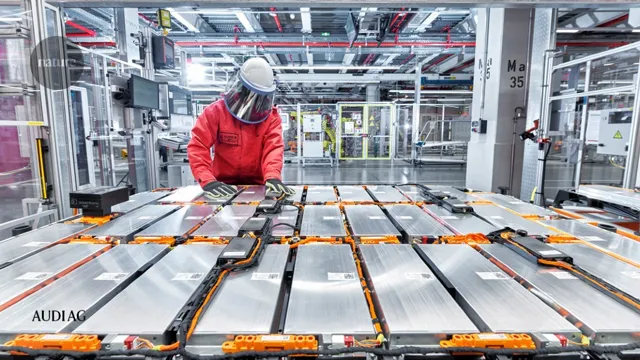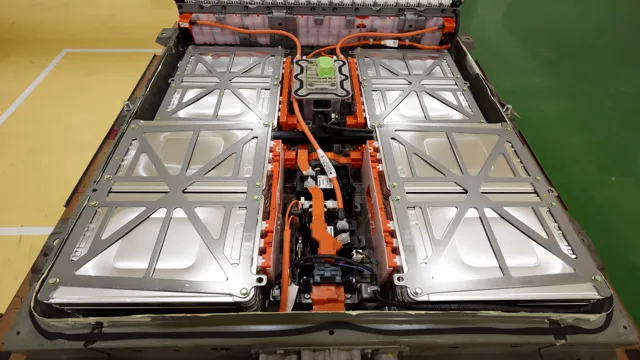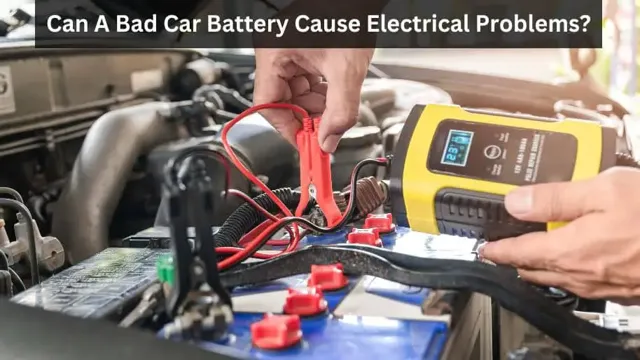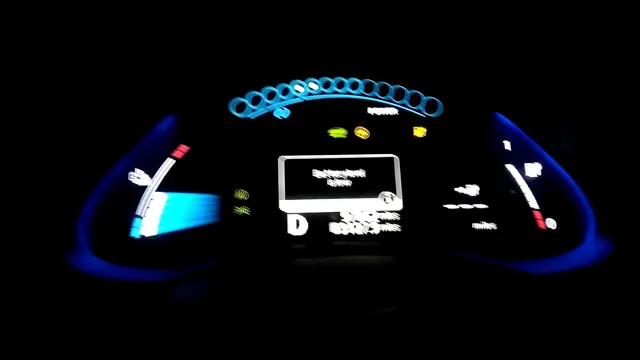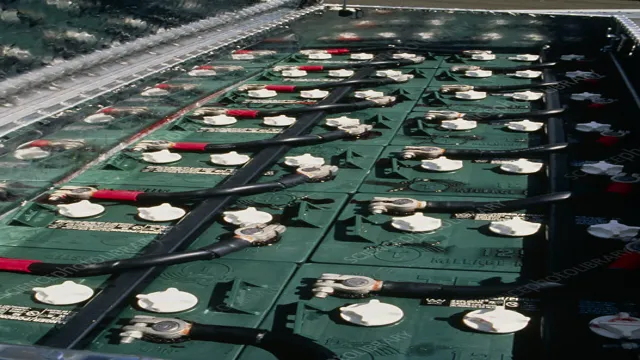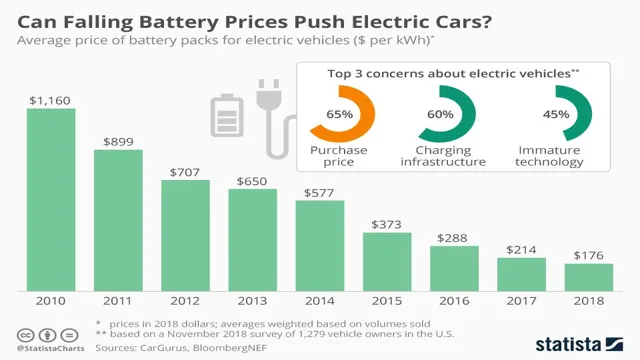Shocking Truths and Current Trends: The Fierce Competition in the Electric Car Battery Industry
Are you interested in the future of the electric car industry? As electric vehicles continue to gain popularity, the competition within the electric car battery industry only gets stronger. With big players like Tesla, General Motors, and Panasonic in the game, it’s a constant battle of who can produce the most efficient and affordable battery. But what goes into making an electric car battery? It’s not just about the size and storage capacity – factors like the materials used, production efficiency, and charging speed all come into play.
And with the demand for electric vehicles on the rise, companies are under pressure to not only create better batteries, but to do it faster and cheaper than their competitors. So who will come out on top in this competition? Will it be the established giants, or will newer companies and startups disrupt the market? And what impact will advancements in battery technology have on the electric car industry as a whole? Follow along as we dive into the exciting world of electric car batteries and the fierce competition driving innovation forward.
Current State of Electric Car Battery Industry
Competition in the electric car battery industry has been heating up in recent years. As more car manufacturers enter the market with electric models, the demand for high-quality batteries has soared. Established companies such as Tesla and Panasonic have been at the forefront of the industry for years.
However, a new wave of competition has emerged, with companies like LG Chem, Samsung SDI, and CATL vying for market share. These companies are developing batteries that are more efficient, longer-lasting, and ultimately more affordable for consumers. The competition is driving innovation and advancement in the industry, which is great news for the future of electric cars.
As the industry continues to expand and evolve, we can expect to see even more competition and exciting advancements in electric car battery technology in the years to come.
Market Share of Major Players
The electric car battery industry has been gaining traction in recent years, with major players like Tesla, BYD, and LG Chem holding a significant share of the market. Tesla, known for its cutting-edge electric cars, also has a notable presence in the battery space with its Powerwall and Powerpack products. Similarly, Chinese automaker BYD has made strides in the industry, offering not only electric cars but also energy storage solutions.
LG Chem, a South Korean company, is also a major player in the industry, supplying batteries to various automakers including Hyundai and Chevrolet. While these companies dominate the market, there is still room for growth as the demand for electric cars and renewable energy continues to rise. As more companies enter the space and develop new technologies, the market share of these major players may shift in the coming years.

Growth Trends and Forecasts
The electric car battery industry has seen significant growth over the past few years. With increasing concern for the environment and rising gasoline prices, people are turning towards electric cars. This has pushed automakers to enhance the battery technology to increase the range, reduce charging times, and improve overall performance.
The current state of the industry is primed for further growth, with many players investing heavily in R&D to develop better and more cost-effective batteries. The industry’s growth is projected to continue, with forecasts estimating it to reach $135 billion by 202 As the demand for electric cars increases, the battery technology will play a pivotal role in shaping the future of the automotive industry.
Factors Affecting Competition
When it comes to competition in the electric car battery industry, there are several factors that come into play. Firstly, the cost of production is a crucial factor, as companies strive to produce high-quality batteries at a lower cost than their competitors. This requires investing in advanced technology and efficient production processes.
Secondly, the availability of raw materials like lithium and cobalt and the cost of acquiring them can significantly impact competition. Additionally, regulations and government incentives that favor clean energy and electric vehicles can create a more competitive market. Lastly, the rapidly evolving nature of the industry and the emergence of new innovative technologies can make it challenging for companies to keep up and maintain their competitive edge.
All in all, these factors combined make for a highly dynamic and competitive environment in electric car battery production, which is beneficial for consumers as it drives innovation and fosters affordable prices.
Technological Innovations
Technological innovations have greatly impacted the level of competition in various industries. Companies that embrace technology and constantly innovate are more likely to stay ahead of their competitors. Technological advancements have made it easier for companies to collect and analyze data, allowing them to make more informed decisions.
Social media has also become a powerful tool for companies to reach a wider audience, increasing brand awareness and customer engagement. Technological innovations have also led to the development of new products and services, which can disrupt traditional markets and change the competitive landscape. However, while technology can provide a competitive advantage, it can also create barriers to entry for smaller companies that do not have access to the same resources.
As such, it is important for companies to continuously innovate and adapt to stay competitive in the ever-changing technological landscape.
Government Regulations
Government regulations play a crucial role in shaping competition within an industry. These regulations can include laws that govern a specific sector’s practices and guidelines. For example, environmental regulations can force companies to implement costly processes that affect their bottom line, whereas health and safety regulations ensure quality standards while adding additional costs.
The manner in which regulations are implemented is also critical. The complexity of the regulations and the cost of compliance can make it harder for smaller companies to keep up with their larger competitors. As a result, government regulations can either promote or diminish competition within an industry, depending on how they are designed and enforced.
Overall, government regulations are critical for ensuring fair market practices and protecting consumer rights. However, regulators should be wary of creating regulations that are needlessly complex and difficult to comply with, as this can result in barriers to entry that stifle competition.
Environmental Concerns
Environmental concerns are a crucial factor affecting competition and businesses need to consider sustainable practices to remain viable in the long term. Consumers are increasingly conscious of their environmental impact and expect companies to make eco-friendly choices. Firms that prioritize environmentally friendly practices in their operations and supply chain can differentiate themselves from competitors, driving customer loyalty and increasing profitability.
In addition to consumer demand, regulations around waste management, emissions, and energy efficiency further highlight the need for companies to integrate sustainability into their strategies. Companies that fail to address these concerns may face reputational damage and potential legal penalties, negatively affecting their competitiveness in the market. Thus, it is essential for businesses to examine ways in which they can reduce their environmental footprint and promote sustainability to remain successful.
Competitive Strategies of Major Players
Competition in the electric car battery industry has been heating up as major players vie for dominance in this rapidly growing market. Tesla, for instance, has invested heavily in developing its own battery technology, which it claims will give it an edge over rivals. Meanwhile, established automakers such as General Motors and Volkswagen are also ramping up production of electric vehicles and investing in new battery technologies to compete with Tesla.
Despite the fierce competition, analysts predict that the market for electric vehicle batteries will continue to grow as more consumers become interested in the technology and governments around the world push for greater adoption of clean energy vehicles. As competition intensifies, it will be interesting to see which companies emerge as the biggest winners in this exciting and fast-paced market.
Leaders in Product Development
When it comes to product development, the competition can be fierce. Major players in various industries constantly strive to stay ahead of the curve by implementing competitive strategies that will help them maintain their position as leaders. One such strategy is staying in tune with the needs and wants of consumers.
Companies that are able to anticipate the market’s demands and develop products that meet those needs tend to come out on top. Additionally, staying innovative and ahead of the curve is another key to success. By investing in research and development, companies are able to create new products that capture the attention of consumers, which helps to keep them ahead of the competition.
Finally, building a strong brand around a product can also contribute to its success. Building strong relationships with customers and creating a sense of loyalty can help to establish a strong foundation that can help a product continue to succeed over time. Ultimately, the product development landscape is complex and challenging, but by staying focused on these three core areas – anticipating the market, staying innovative, and building a strong brand – companies can position themselves for success.
Emerging Competitors in the Market
As the market evolves, emerging competitors are constantly entering the arena, challenging the major players’ positions. To keep their competitive advantage, established companies focus on developing and executing effective strategies, both offensively and defensively. One of the most crucial aspects of maintaining a leading position is to continually innovate and improve their products or services.
They also invest in advertising and marketing to stay top-of-mind for consumers. Another crucial strategy is to forge partnerships and collaborations with other industry leaders and maintain strong relationships with suppliers and distributors. Additionally, major players must keep a watchful eye on emerging competitors, monitoring their strengths and weaknesses, and adapting accordingly.
By implementing a combination of these strategies, major players can effectively compete with emerging competitors and maintain their position in the market.
Future Outlook of Electric Car Battery Industry
Competition in the electric car battery industry is heating up as the demand for electric vehicles continues to rise. The advancement of battery technology may prove to be the key factor in determining which company will dominate the market. Traditional car manufacturers such as Tesla, General Motors, and Ford have been joined by tech giants such as Apple and Amazon in the race to create the most efficient and long-lasting battery.
With so many players in the field, it’s difficult to predict which company will emerge victorious. However, as research and development continue, we can expect breakthroughs that will increase the capacity, range, and lifespan of batteries, making electric vehicles even more appealing to consumers. While challenges such as production costs and supply chain management still exist, the future outlook of the electric car battery industry is promising and exciting.
Conclusion
In the world of electric cars, the competition in the battery industry is like a high-speed race where every participant is equally qualified and determined to cross the finish line first. Each company is putting its innovation and creativity to the test to come up with the next best battery that can power the cars smoothly and efficiently. It’s a battle of wits, skills, and brand loyalty.
But at the end of the day, the one who will emerge victorious is the one who can charge ahead, not just in creating great batteries but also in building a better, cleaner, and more sustainable future for generations to come. The competition in the electric car battery industry is not just about being the best, but also about doing what’s best for the world.
FAQs
What is the current state of competition in the electric car battery industry?
The electric car battery industry is highly competitive with major players like Tesla, LG Chem, Panasonic, and BYD dominating the market.
How are companies in the electric car battery industry trying to gain a competitive edge?
Companies are investing heavily in research and development of new battery technologies, forming strategic partnerships, and expanding their production facilities to increase output.
What challenges does the electric car battery industry face?
The industry faces several challenges including high production costs, limited availability of raw materials like lithium, and regulatory barriers.
What innovations are we likely to see in the electric car battery industry in the future?
We can expect to see improvements in battery capacity, faster charging times, and increased energy efficiency as companies continue to invest in research and development. Additionally, more sustainable and environmentally friendly manufacturing processes are likely to be developed in the future.
